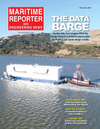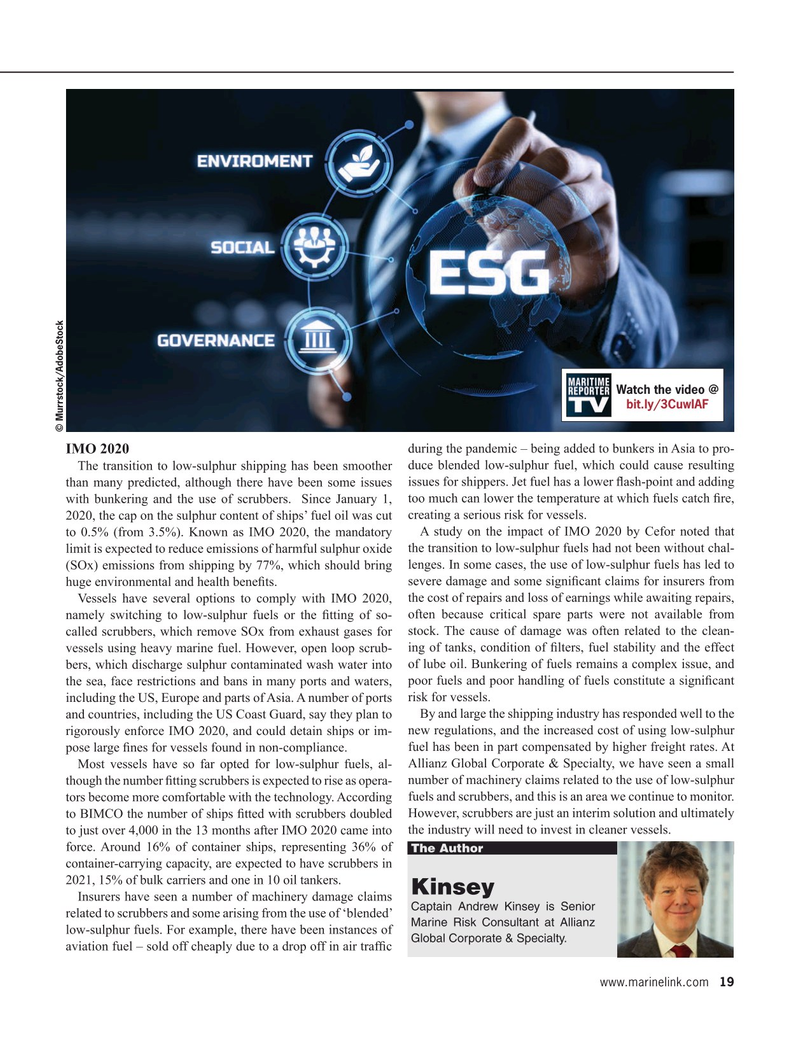
Page 19: of Maritime Reporter Magazine (November 2021)
The Workboat Edition
Read this page in Pdf, Flash or Html5 edition of November 2021 Maritime Reporter Magazine
Watch the video @ bit.ly/3CuwIAF © Murrstock/AdobeStock during the pandemic – being added to bunkers in Asia to pro-
IMO 2020
The transition to low-sulphur shipping has been smoother duce blended low-sulphur fuel, which could cause resulting than many predicted, although there have been some issues issues for shippers. Jet fuel has a lower ? ash-point and adding with bunkering and the use of scrubbers. Since January 1, too much can lower the temperature at which fuels catch ? re, 2020, the cap on the sulphur content of ships’ fuel oil was cut creating a serious risk for vessels.
to 0.5% (from 3.5%). Known as IMO 2020, the mandatory A study on the impact of IMO 2020 by Cefor noted that limit is expected to reduce emissions of harmful sulphur oxide the transition to low-sulphur fuels had not been without chal- (SOx) emissions from shipping by 77%, which should bring lenges. In some cases, the use of low-sulphur fuels has led to huge environmental and health bene? ts. severe damage and some signi? cant claims for insurers from
Vessels have several options to comply with IMO 2020, the cost of repairs and loss of earnings while awaiting repairs, namely switching to low-sulphur fuels or the ? tting of so- often because critical spare parts were not available from called scrubbers, which remove SOx from exhaust gases for stock. The cause of damage was often related to the clean- vessels using heavy marine fuel. However, open loop scrub- ing of tanks, condition of ? lters, fuel stability and the effect bers, which discharge sulphur contaminated wash water into of lube oil. Bunkering of fuels remains a complex issue, and the sea, face restrictions and bans in many ports and waters, poor fuels and poor handling of fuels constitute a signi? cant including the US, Europe and parts of Asia. A number of ports risk for vessels. and countries, including the US Coast Guard, say they plan to By and large the shipping industry has responded well to the rigorously enforce IMO 2020, and could detain ships or im- new regulations, and the increased cost of using low-sulphur pose large ? nes for vessels found in non-compliance. fuel has been in part compensated by higher freight rates. At
Most vessels have so far opted for low-sulphur fuels, al- Allianz Global Corporate & Specialty, we have seen a small though the number ? tting scrubbers is expected to rise as opera- number of machinery claims related to the use of low-sulphur tors become more comfortable with the technology. According fuels and scrubbers, and this is an area we continue to monitor. to BIMCO the number of ships ? tted with scrubbers doubled However, scrubbers are just an interim solution and ultimately to just over 4,000 in the 13 months after IMO 2020 came into the industry will need to invest in cleaner vessels.
force. Around 16% of container ships, representing 36% of
The Author container-carrying capacity, are expected to have scrubbers in 2021, 15% of bulk carriers and one in 10 oil tankers.
Kinsey
Insurers have seen a number of machinery damage claims
Captain Andrew Kinsey is Senior related to scrubbers and some arising from the use of ‘blended’
Marine Risk Consultant at Allianz low-sulphur fuels. For example, there have been instances of
Global Corporate & Specialty.
aviation fuel – sold off cheaply due to a drop off in air traf? c www.marinelink.com 19
MR #11 (18-33).indd 19 11/4/2021 9:39:43 AM

 18
18

 20
20
